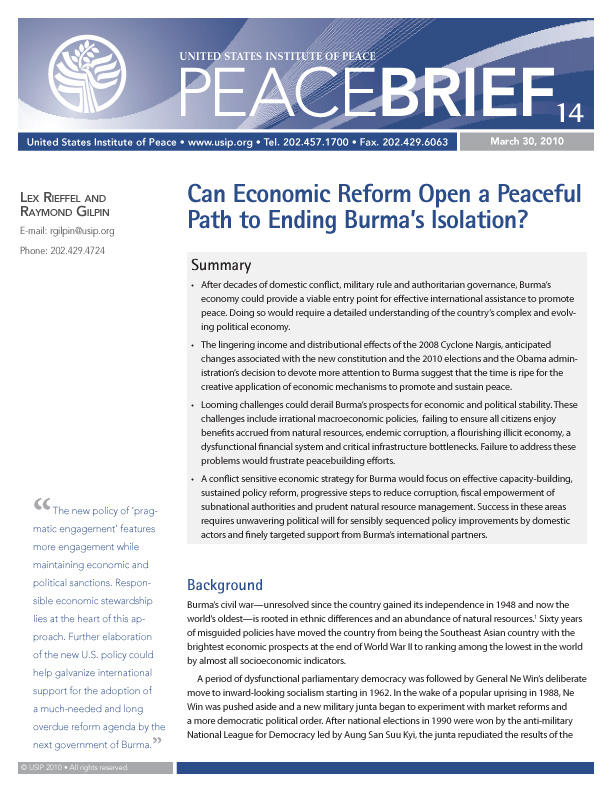After decades of domestic conflict, military rule and authoritarian governance, Burma’s economy could provide a viable entry point for effective international assistance to promote peace. Doing so would require a detailed understanding of the country’s complex and evolving political economy.

Summary
- After decades of domestic conflict, military rule and authoritarian governance, Burma’s economy could provide a viable entry point for effective international assistance to promote peace. Doing so would require a detailed understanding of the country’s complex and evolving political economy.
- The lingering income and distributional effects of the 2008 Cyclone Nargis, anticipated changes associated with the new constitution and the 2010 elections and the Obama administration’s decision to devote more attention to Burma suggest that the time is ripe for the creative application of economic mechanisms to promote and sustain peace.
- Looming challenges could derail Burma’s prospects for economic and political stability. These challenges include irrational macroeconomic policies, failing to ensure all citizens enjoy benefits accrued from natural resources, endemic corruption, a flourishing illicit economy, a dysfunctional financial system and critical infrastructure bottlenecks. Failure to address these problems would frustrate peacebuilding efforts.
- A conflict sensitive economic strategy for Burma would focus on effective capacity-building, sustained policy reform, progressive steps to reduce corruption, fiscal empowerment of subnational authorities and prudent natural resource management. Success in these areas requires unwavering political will for sensibly sequenced policy improvements by domestic actors and finely targeted support from Burma’s international partners.
About This Brief
This USIPeace Brief reflects discussions at the full-day workshop captioned "Burma’s Economy on the Eve of Elections," jointly organized by USIP’s Center for Sustainable Economies and the U.S.-ASEAN Business Council on March 4, 2010. Details of this event are available on the USIP Web site; conclusions and recommendations will be published as a USIP Special Report in April 2010. This Peace Brief was written by Lex Rieffel, a non-resident senior fellow at the Brookings Institution, and Raymond Gilpin, associate vice president for USIP’s Sustainable Economies Center. The authors’ views do not necessarily represent the positions of the organizations with which they are affiliated.
For the Burmese version of this brief, click here.